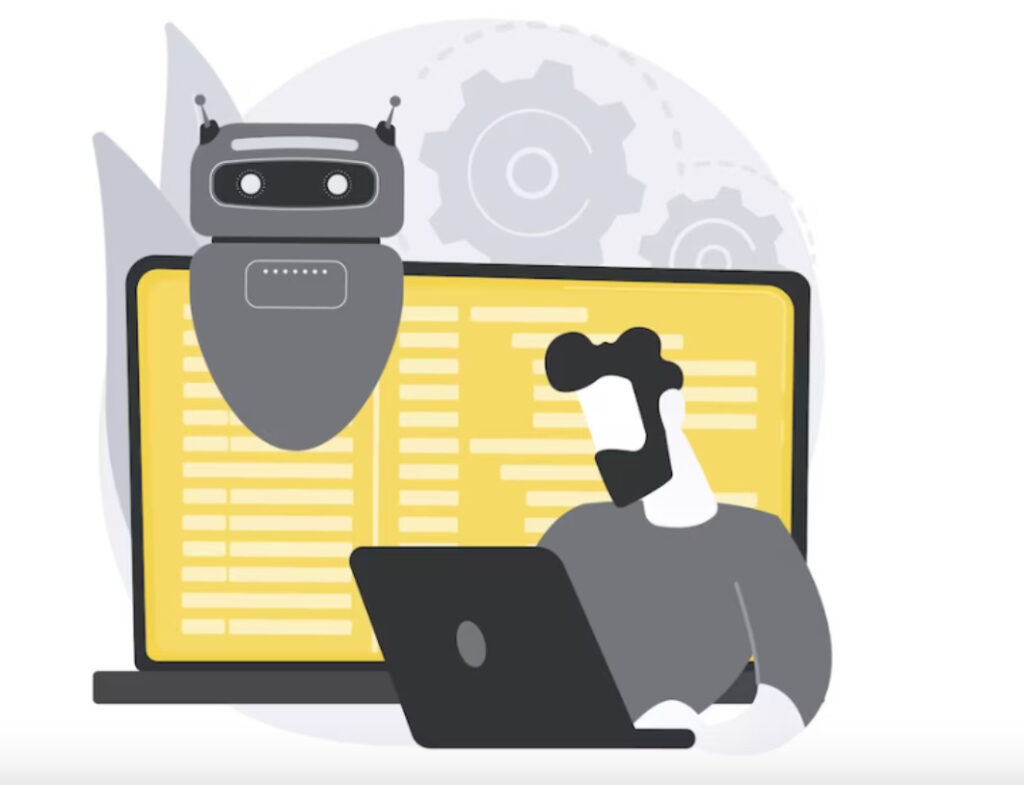In this article, we will have a look at Writing Smarter, Not Harder – A Guide to AI Tools.
The written word has become more widespread than before. Whether it’s blog posts, articles, product descriptions, or reviews there is a demand for written content. This presents a challenge for writers and content creators who need to produce high-quality material. Fortunately, Artificial Intelligence (AI) has stepped in and revolutionized the world of writing.
Innovations in the field of machine learning are what led to the current surge in everything AI. Instead of relying on human programming. It includes “training” computers to carry out tasks based on examples. This strategy has significantly increased in power thanks to a process called deep learning.
There is proof that AI can improve our well-being. There is however cause for caution as well. There have been instances where algorithms have picked up on or magnified race. Or gender biases in society, demonstrating that an AI-enhanced future won’t always be a better one.
This guide explores the impact of AI on writing. It provides an overview of AI writing tools. Their advantages. How to use them effectively. Additionally, we delve into the considerations surrounding AI-generated content. Take a glimpse into the future to anticipate how AI will continue to shape the writing landscape.
The Emergence of AI in Writing
The earliest version of artificial intelligence was a weekend effort. The phrase was first used by Dartmouth professor John McCarthy in the summer of 1956. When he asked a select group to spend a few weeks discussing ways to make robots perform tasks like using language.
The Evolutionary Journey of AI in Writing
The progress made by AI writing tools has been truly remarkable. We begin by tracing their origins from text generators to models capable of natural language processing. This evolution has not only increased efficiency in creation but also expanded creative possibilities beyond imagination.
Understanding Natural Language Processing (NLP)
To fully grasp the capabilities of AI in writing it is crucial to understand its technology; Natural Language Processing. We unravel the complexities of natural language processing (NLP). Delve into the mechanisms through which machines comprehend and interpret language. This understanding serves as the gateway to unleashing the potential of AI-powered writing tools.
The Impact of AI on Content Creation
AI has left an indelible mark on the world of content creation. From assisting writers in brainstorming ideas to automating the creation of entire articles. We explore how AI has revolutionized the content generation process. We also examine real-world examples of AI-generated content that rivals human craftsmanship.

Following are the types of AI writing tools that you can use and enhance your writing skills.
Engaging AI content creation Tools
With the help of AI content creation tools, you can make your content unique. With the help of an AI-based summary generator, you can summarize the long text easily and make your content attractive, appealing and engaging.
An AI summary generator naturally gets the setting and appropriately condenses the substance to the shortest length conceivable. AI tools take no time to form a summary of the given substance and then show the results on the user’s screen.
The summary generator enables it to get the setting of the given and then extricate key focuses from it in a similar manner. It carefully displays the key focuses in a short descriptive way that not one or the other compromises quality nor changes the characteristic meaning. It takes as many seconds to create the rundown of the given substance as required.
Grammar and Style Checkers
Eliminating grammatical and spelling errors is essential for polished writing. AI-powered grammar and style checkers not only catch mistakes. But also offer suggestions to improve readability and coherence. We explore how these tools elevate the quality of your content.
Language Translation Tools
AI-fueled language translation systems are breaking down language obstacles. Making room for tailored content delivery to diverse populations. Examining the role of AI in accessibility to language communities, we look at.
Benefits of using AI writing tools
National security is one area where AI has been adopted with increasing frequency, among others. Acceleration happens with business help and healthcare. With developments in AI, thanks to technologies. And growth through open-source machine-learning initiatives. The following are the benefits of using AI writing tools:
Time-Saving and Efficiency
Time is treasured by writers. Writers now have more room to concentrate on creative and strategic work thanks to AI writing instruments. By simplifying the writing process, AI helps boost productivity.
Consistency and Accuracy
Consistency and accuracy are hard to maintain during the writing process. By following guidelines and rules for grammar. AI helps writers create work without errors or inconsistencies. By examining how AI supports writers, we discover its role in crafting excellent content.
Improved Inventiveness and creativity
Far from the apprehension that AI might limit creativity, we discover how it can enlarge it. Suggestions and content ideas generated by AI can generate novel ideas. And motivate authors to explore new areas in their writing.
Multilingual Capabilities
The global nature of the web necessitates content in various languages. AI can quickly translate and localize content, making it available to a global audience. We examine the importance of multilingual abilities in content production.
Data-Driven Experiences for Substance Optimization
AI does not just aid in content creation; it also provides significant data-driven insights. We investigate how AI-generated data can direct content optimization tactics. Ensuring that your content resonates with your intended audience.
How to make Effective use of AI Writing Tools?
When picking an AI tool, your specific requirements should be a top priority. With so many choices available, the market overflows with AI tools catering to individual preferences. Our focus lies in matching tools to your particular objectives, making sure they coincide with your goals.
With AI incorporated, your work output can improve significantly with increased efficiency. Integration into your daily workflow makes AI tools incredibly useful, almost unseen. Daily writing routine enhancement through AI integration is our focus.
Tailored and modified, AI-generated content may reach its full potential. Despite AI capabilities, human touch cannot be replicated. Ensuring an ideal blend of artificial intelligence and originality demands tweaking. And enhancing content generated by AI using your special voice and style.
AI and human creativity when merged lead to something innovative. The helping hand that AI offers can never fully replace the original thought process of humans. How to balance AI support and creative instincts when producing original work is explored.
The digitalization of society has been enormously supported by AI. This has made it conceivable for us to gather, plan, and analyze endless sums of data more rapidly than in the past. Present-day propellers, advanced commercial shapes. And more self-evident effectiveness in an assortment of businesses has all brought about this. AI has altogether impacted different media groups, counting content, video, and 3D.
Responsible AI usage depends on ethical guidelines. With AI now intertwined with writing, ethics take center stage. Potential biases, originality preservation, and privacy/data security concerns are just some of the ethical complexities surrounding AI-generated materials.
Challenges and Ethical Considerations
Recognition of biases present in AI-generated content is crucial. On biased data, AI is trained, which implies. How do biases seep into AI-produced material? We address this issue head-on and present methods to combat it. Following are some challenges of AI writing tools:
Maintaining Originality and Authenticity
With AI writing tools, there lies a concern over the potential for unoriginal and inauthentic output. How writers can protect their particular tone and vantage point is at the forefront of our investigation.
Privacy and Data Security Concerns

Writing that employs AI also raises important questions about data protection and privacy. In an AI-driven writing setting, how may we deal with these worries?
Ensuring Transparency and Accountability
Essential for building trust, transparency must be present in AI-generated content. Content creation transparency and AI responsibility are central to our discussion.
Where does AI fit into the future?
Now we will see what is the future of AI writing tools. What progress these tools can make in the future:
The road ahead remains long for AI writing journeys. With expected enhancements in AI writing abilities, we look forward to seeing expanded content creation capabilities along with better language interpretation and sentiment analysis.
AI integration within Content Management Systems holds much promise. Integration within content management systems will enable AI to work hand in hand with writers and editors, streamlining their workflow. Content workflow integration, AI explores. Another area where AI is having an impact is education. Learning experiences are changing thanks to AI. From customized content creation to automated grading and feedback.
Content creation through artificial intelligence (AI) is trending. Dynamic, the landscape of AI-driven content creation is. Emerging trends in content creation, including AI-powered curation, how do we identify them?
Conclusion
We explore how AI has transformed the world of writing in depth in this comprehensive guide. For writers and content creators, AI has proven itself to be irreplaceable from its early days through current applications and beyond.
Efficiency, consistency, and multilingual proficiency stand to gain with AI, however, so do ethical dilemmas. Achieving an ideal mix of AI help and human imagination is central to maximizing AI capabilities in compositions.
Moving forward, how will AI shape content creation? Not just a choice but rather a necessity, embracing AI in the writing process is for those aiming to write smarter instead of harder.
If this has been helpful, then please also subscribe to our Youtube channel – Our Technology Planet for more exciting stuff and videos.
Haider Khalid
Latest posts by Haider Khalid (see all)
- 5 Essential Tips for Maintaining Your Vehicle’s Performance - June 20, 2025
- 4 Steps To Manage Your Business More Effectively - June 14, 2025
- The Top 5 Sustainable Practices for Businesses to Implement This Year - June 14, 2025
